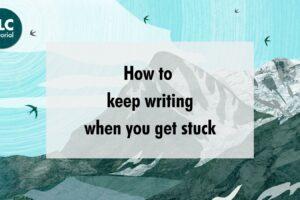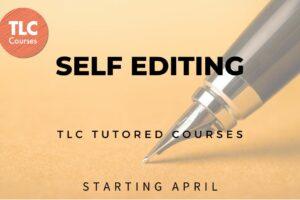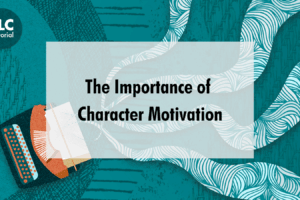How to Keep Writing When You Get Stuck
We’ve all been there. You get an idea, it’s a great idea, it’s the best idea. You start writing and everything is flowing, creative, and exciting. Then, everything grinds to a halt. You lose motivation. The idea feels less shiny, though no less important. You want to keep going, because you know that the story you want to tell could be great, but you can’t find a way past the current word count, which suddenly feels immoveable. Here’s how to keep writing when you get stuck.
Work out what’s in your way
What’s really going on? Try to sit with yourself in stillness, to give yourself space to figure out what’s going on without the pressure blocking your view. Clear a path. Look forward. What do you see immediately in front of you?
- I fell in love with the idea more than the act of writing the idea
- Now that it’s started to become real, I’m worried it’s not good enough
- Now that I’ve started to put the words on the page, they aren’t living up to how it looked in my head (maybe I’m not good enough?)
- Help! The pressure is making this feel like work, not something creative
Getting clarity on what’s in our way (often, it’s ourselves) can be a simple but effective first step. This has the same effect as becoming convinced there is someone in your room, and switching on the light. Ah, so that ‘man in the doorway’ is actually a coathanger and an old jacket. Suddenly, far less scary! And now, you can sleep safely. The same with your writing. Name the thing that feels difficult. Visualise it. Make it real. Now, you can take a step forwards. And what is the journey towards ‘The End’, except a series of steps forwards?
Re-write negative messaging
Procrastination is often a symptom of anxiety, and another symptom of that anxiety is negative self talk. In her popular self-paced Being A Writer course ‘Breaking Through Writers’ Block’, TLC tutor Sascha Akhtar proposes this fantastic exercise:
Jot down on a scrap piece of paper the things that you feel are stopping you in a list on the left hand side. Now, for each negative self-message, write a positive self-message on the right hand side. Here’s an example using the list above:
What’s wrong with me? There is nothing wrong with me!
I’m such an idiot. I have completed a postgraduate diploma.
I’m never going to write. I will write today, even if it’s a sentence.
So-and-so writes every day. I am not so-and-so.
Why can’t I just write? I can write. It just might not be perfect.
Looking at your columns above, take a moment to reflect on the ‘positively framed’ statements. In inviting your mind to approach your creative endeavours with a ‘can-do’ and positive mindset, we are also preparing well-seasoned soil in which to create. Gardeners know that before planting out seedlings, they must prepare the soil; some may choose the ‘no-dig’ approach whereby the soil is left untouched; others may prefer to turn the soil over and filter out every root, stone and pebble. Either way, with the activity above we are choosing a mindset in which to begin. You can teach yourself how to keep writing, by being conscious in this choice.

The 90-day Zero Draft
Your challenge is to write a draft in the next 90 days. But not a first draft. A zero draft. The draft before the first draft. It’s your worst draft, by design. Your zero draft is the one that has square brackets where you are going to later fill in a whole chapter or a piece of dialogue, the one that has a doodle on page 20 to indicate introducing a new character, the one that’s out of order and has short hand in crayon, bullet points, crossings-out and lots of big question marks all over it, like ‘Something EXCITING needs to happen here as it’s the mid-point, this is where Nasreen finds out that Chris is in fact still alive: she receives an anonymous note which we later find out is in fact from her sister!’
Your zero draft might only end up being 35,000 words long. Because it’s not a first draft. But it won’t be your first 35,000 ready-to-go words either. It will be 35,000 words with a beginning, middle and an end. It’s not a plan, it’s not a spreadsheet, it’s writing. Deliberately bad, messy, glorious, energetic writing. And somewhere in there, incubating safely and already starting to grow a sense of itself, is your story. Keep hold of the fun and the joy of that initial, precious idea. Guaranteed, even in the editing process, some of that will stick, and that’s what will inform the all-important unique ‘voice’ of the book.
You can edit a bad story and make it into a book with love and care and commitment.
You can’t edit a chapter and hope it turns itself into a book.
Give yourself 90 days. See what happens. You aren’t just permitted to make it messy – you are invited to.
In need of more creative inspiration that goes beyond ‘how to write a compelling first page’, and really reaches into the core of how to be more creative, every day? Make sure you’re signed up to Conscious Writing Month. Get unstuck and become unstoppable!
If you’re a member of Being A Writer, you can access our popular self-paced ‘How to Break Through Writer’s Block’ course by logging in and heading to ‘Courses’ in the Being A Writer Toolkit.








